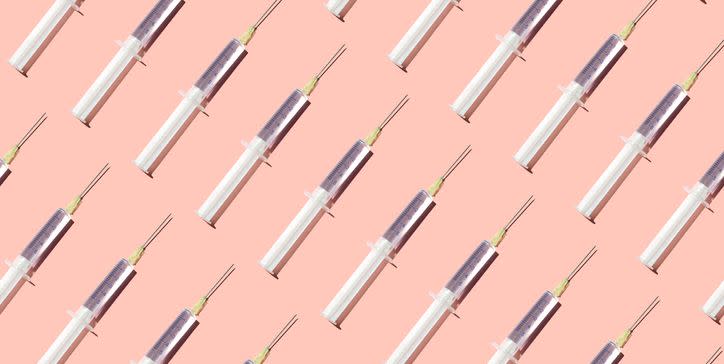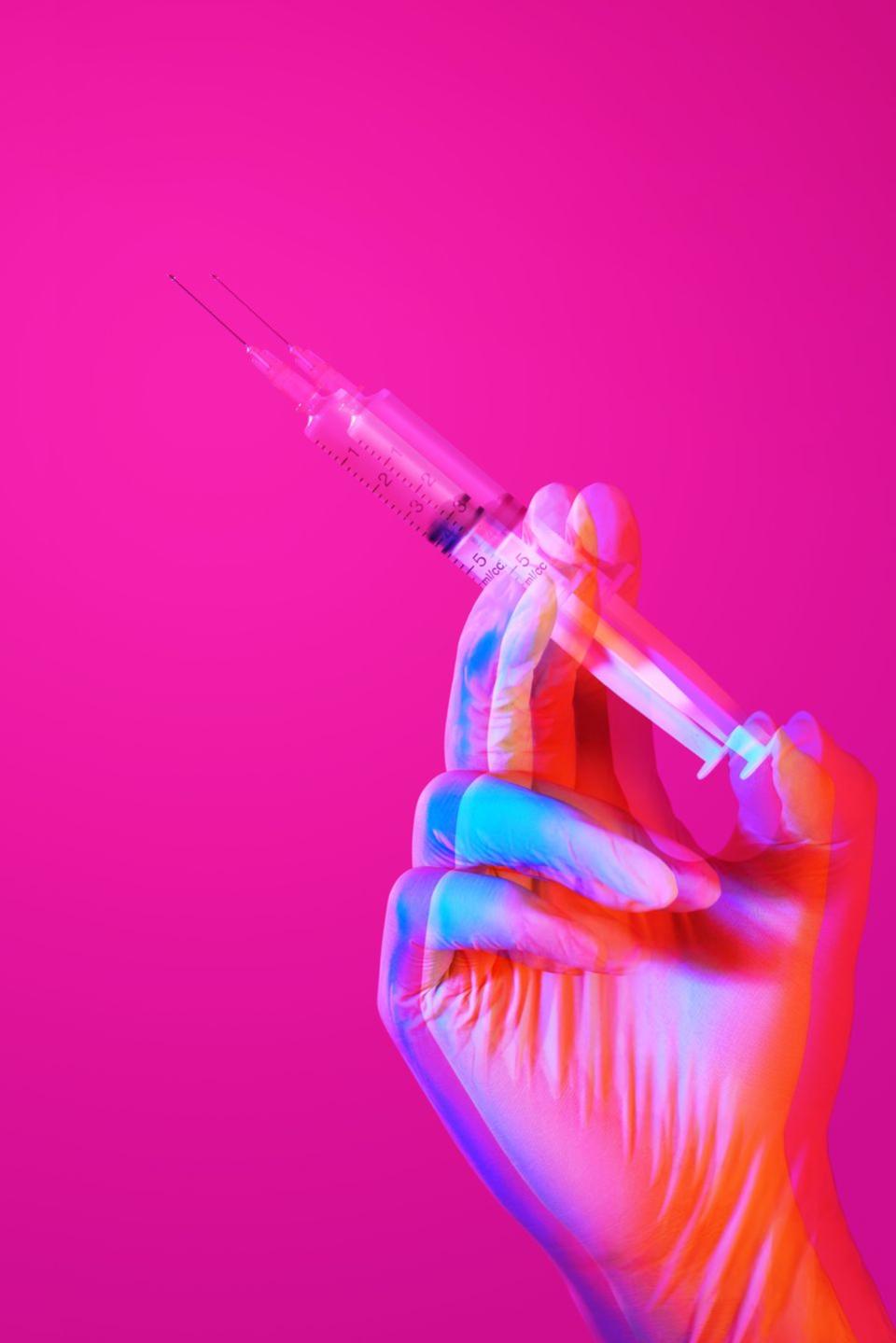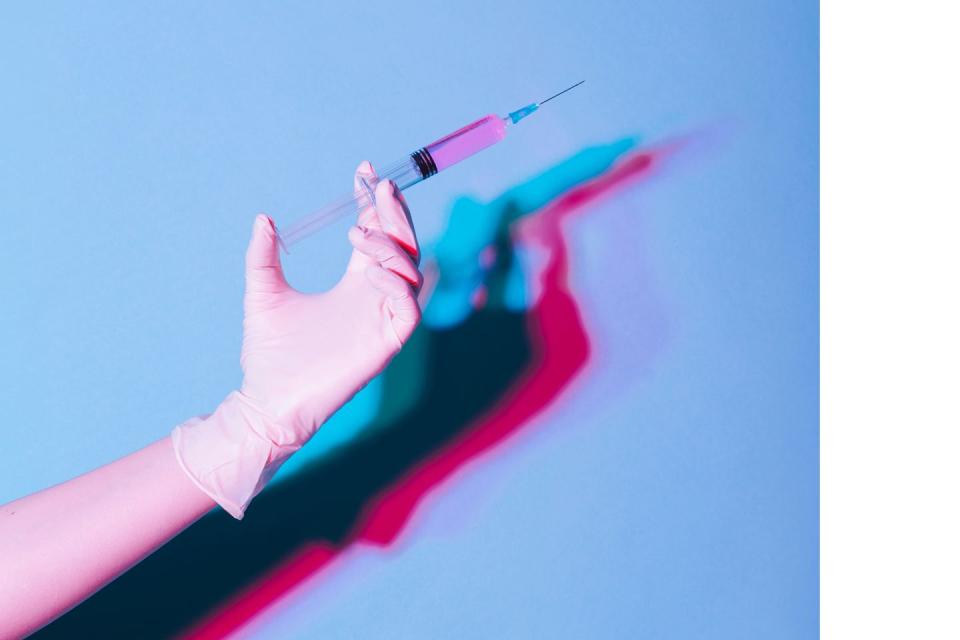Everything You Need to Know About the COVID-19 Vaccine

"Hearst Magazines and Yahoo may earn commission or revenue on some items through the links below."
Even though over half of the U.S. population is fully vaccinated against COVID-19, there’s still a lot of misinformation circulating about the shots. Which is why you’re reading this article, right? To learn more about the COVID-19 vaccines and figure out what’s right for you. Glad you’re here.
Let’s kick things off with the most important takeaway: While the vaccines don’t necessarily stop you from getting or spreading COVID-19, they do drastically reduce your chances of going to the hospital or dying from the disease if you do get it. And that’s a big win.
Over the course of the pandemic, public health recommendations have continued to change, sometimes at a dizzying pace (remember all the scaremongering about not touching your face or eyes? Sigh)—and it can be really frustrating. But one thing remains crystal clear: COVID-19 is a very real risk—yes, even if you’re young and healthy—and the vaccines are the best tool we have to fight it.
We—including the scientific community who is working 24/7 to help end the pandemic— all want this to be over, and vaccines can help us get there. Read on to have all your vaccine-related questions answered, and remember, this is a judgment-free zone.
Boston health care workers dancing on the sidewalk to celebrate the arrival of the first covid-19 vaccine. pic.twitter.com/7Aw61484xR
— Anaridis Rodriguez (@Anaridis) December 14, 2020
How do the vaccines work, anyway?
The Pfizer-BioNTech, which was authorized by the FDA for people over 16, and Moderna, which was given emergency authorization by the FDA for adults over 18, vaccines use mRNA technology. Both of their large-scale clinical trials have shown that they are extremely effective at preventing severe disease and death, and they both require two doses to be given over the course of three or four weeks.

Now let’s break down the science. Many vaccines are “live” vaccines (think: the MMR shot or the flu shot). These contain live, weakened versions of a disease that the body recognizes and builds up an immune defense against. But…plot twist! The COVID-19 Pfizer-BioNTech and Moderna vaccines do not contain the live virus. Instead, they work using mRNA technology. When you see pictures of COVID-19 cells, you can spot those telltale “spikes” surrounding the cell. “These famous spikes are used by the virus to enter our cells, mostly those in our airways—nose, throat, and lungs,” says Noam Tau, MD, a physician and researcher at Israel’s Sheba Medical Center. “These spikes are also the ‘face’ of the virus, which our body recognizes when it creates an immune response.”
So how does an mRNA COVID-19 vaccine work? Essentially, Dr. Tau says, you can think of it like an “instruction booklet” for how to build those COVID-19-like spikes. “The body then takes the instruction book and inserts it into our cells, which creates a whole lot of spikes,” he explains. “These spikes, of course, are not capable of causing any disease and only help teach our immune system how to protect itself against COVID-19. The spike instruction book is then destroyed, and none of it should be left in our cells within a short period of time after the vaccine.”
Johnson & Johnson’s vaccine, which has been authorized by the FDA for emergency use for people over 18, is a “viral vector vaccine.” It uses a modified virus—in this case, a modified adenovirus, which is the virus behind the common cold—to deliver “important instructions to our cells,” the CDC says. “For COVID-19 viral vector vaccines, the vector (not the virus that causes COVID-19 but a different, harmless virus) will enter a cell in our body and then use the cell’s machinery to produce a harmless piece of the virus that causes COVID-19.” The keyword here: harmless.
So, um, which vaccine is the best?
The good news is that all three vaccines available in the U.S. work incredibly well to protect you against getting a serious case of COVID-19. But in case you want to nerd out, Yale Medicine has a detailed breakdown on each vaccine’s effectiveness:
Pfizer is 91.3% effective at preventing symptomatic COVID-19 infection. According to research published by Pfizer, their vaccine is “100% effective in preventing severe disease as defined by the CDC, and 95.3% effective in preventing severe disease as defined by the FDA.”
Moderna published research in April 2021 showing their vaccine had “continued strong efficacy, including greater than 90% against cases of COVID-19 and greater than 95% against severe cases of COVID-19.”
Johnson & Johnson has “72% overall efficacy and 86% efficacy against moderate and severe disease in the U.S.,” according to Yale Medicine.
Are there side effects?
As of September 2021, over 390 million COVID vaccine doses have been administered in the United States. The CDC says that no long-term side effects have been noted, but a very, very small number of people have had adverse reactions.
The FDA has attached a warning label to the Pfizer and Moderna vaccines, warning consumers that they may be linked to “reported cases of heart inflammation in young adults,” Yale Medicine reports. The inflammation is extremely uncommon—it only impacts about 12.6 cases per million second doses administered—and tends to get better on its own without any sort of medical intervention.
The FDA has also attached two warnings to the Johnson & Johnson vaccine. One warns consumers about a rare subset of patients who developed a neurological disorder called Guillain-Barré syndrome within 42 days of getting the vaccine. According to the CDC, more than 14.7 million doses of the Johnson & Johnson vaccine have been administered in the U.S., and there have been 201 reports of recipients developing Guillain-Barré syndrome as of September 2021.
The second warning came in April 2021, after the FDA ended a pause they had put on the vaccine “out of an abundance of caution” because of an uncommon, but potentially serious, blood clotting disorder, according to Yale Health. As of September 2021, there have been 47 confirmed reports of people developing the blood clotting disorder after getting the J&J vaccine.
The bottom line? Adverse effects are extremely rare.
What you might feel after getting the shot is a sore arm or swelling around the injection site, which are common side effects for a bunch of vaccines. You’ve probably experienced a sore arm after getting the flu shot. You may also experience symptoms like headache, fever, or chills—but plenty of people feel no side effects at all.
Here’s the big takeaway: “Just because a vaccine has side effects doesn’t mean it’s not safe,” says Abisola Olulade, MD, a family medicine physician with Sharp Healthcare in San Diego. “In fact, a lot of the vaccine side effects that we see, such as arm soreness, headache, fever, and chills, are signs that your immune system is responding well to the vaccine and working to build protection against the infection.” Plus, she says, most side effects go away within a day or two.
Is there anyone who shouldn’t take the vaccine?
Currently, COVID vaccines are not approved for anyone under the age of 12, but trials are underway. In early September, the FDA released a report on vaccine testing in kids that read: “We are working as expeditiously as possible to meet this critical public health need and we very much hope to have pediatric COVID-19 vaccines available in the coming months.”
Also, people who have “had a severe allergic reaction (anaphylaxis) or an immediate allergic reaction” to vaccine ingredients shouldn’t get one. You can speak to your doctor for more information.
Should I get the vaccine if I'm pregnant?
The short answer: Yes. Currently, the American College of Obstetricians and Gynecologists (ACOG), the Society for Maternal-Fetal Medicine (SMFM), and the CDC all recommend that pregnant women get vaccinated.
“The data is overwhelming that COVID vaccination is safe for women who are planning to get pregnant or who are pregnant,” says Dr. Lora Shahine, MD, FACOG at Pacific NW Fertility.
And you really don’t want to contract COVID while you’re pregnant. “Women who are pregnant have a higher risk of getting very sick from COVID," warns Dr. Shahine. "They have a higher risk of ICU admission, hospitalization, intubation, and death from contracting the COVID virus. Vaccination from COVID decreases all of these risks for pregnant women.”
“During pregnancy, your immune system is suppressed,” explains Dr. Harvey Karp, MD, a pediatrician and CEO of Happiest Baby. “That keeps your body from seeing your baby as a threatening ‘parasite’ and trying to reject it, but also makes you more vulnerable to other icky illnesses, including COVID-19. (Many pregnant women notice that they’re quicker to catch a cold than usual.) At the same time, pregnancy hormones and your growing fetus can spur respiratory changes that make any respiratory illness, like COVID, more dangerous.”
Dr. Alexa Mieses Malchuck, MD, MPH, a family physician in Durham, North Carolina who is pregnant with her first child, encourages pregnant folks to speak to their doctors about any vaccine concerns:
“I know it can be confusing for many people to read or hear different things all the time about COVID and vaccines. For this reason, I always stress the importance of building a relationship with a trusted family physician. Family physicians are trained to help patients wade through the massive amount of health information that exists in the world and to help patients arrive at an informed decision that fits their lifestyle. I want to do everything I can to keep myself and my baby safe, and I encourage all pregnant women to do the same. I also hope to be able to share my personal experience with my patients if it can help them decide whether to undergo vaccination or not.”
I heard the vaccine affects fertility. Is that true?
This is a fairly common and especially harmful myth, and it deserves a section of its own. “Claims linking COVID-19 vaccines to infertility are unfounded and have no scientific evidence supporting them,” Dr. Copperman says. To quickly sum up loads of research: “Sperm count, egg yield, and implantation and pregnancy rates are not compromised in vaccinated patients,” assures Dr. Copperman.
Dr. Aimee Ferraro, PhD, MPH, an epidemiologist and faculty member in Walden University’s PhD in Public Health and Master of Public Health programs, says that “the only complaints that could be real are disruptions to the menstrual cycle. There have been anecdotal reports by women following COVID-19 vaccination claiming increased flow and missing a month. However, there are too many confounding factors to link these changes directly to the vaccine. It could be due to pandemic stress or changes in lifestyle.”
Do the vaccines work against these new variants, like Delta?
“New variants, or strains, happen with viruses all the time,” says Dr. Jeni Stolow, PhD, MPH, a social and behavioral scientist and professor of public health at Temple University. “That's normal and was expected.” Just think about the flu—it mutates regularly, which is why there’s a different flu shot each year to help protect you against the new strains.
”Every time the virus reproduces, it has an opportunity to mutate,” Dr. Stolow explains. “The more it reproduces, the more likely it is to mutate. Since the COVID-19 virus spread around the world and infected millions of people, it has had a lot of opportunities to reproduce and mutate. New variants were bound to happen. And that is one of the reasons why we want people to get vaccinated! The less opportunity the virus has to reproduce, the less opportunity it has to mutate.”
Experts acknowledge that the existing vaccines may not be fully effective against new COVID-19 variants, but they’ll almost certainly still help prevent hospitalization and death from the disease. Right now, researchers are looking into booster shots to see if they can specifically help tackle the new variants.
What's the deal with booster shots?
Okay, let’s start with the basics. “A booster shot is an additional dose of a vaccine needed to ‘boost’ your immunity,” says Joseph Iser, MD, DrPH, an executive officer of the American College of Preventive Medicine. “This will give you better protection from disease [because]...over time, the protection many vaccines provide [can] experience a reduction in effectiveness.”

“Studies from all over the world indicate that immunity to COVID-19 begins to wane about 200 days following vaccination from the mRNA vaccines (Pfizer and Moderna), so there is a precedent to provide booster shots as an effort to protect against complications from emerging variants like the Delta,” Dr. Ferraro says. “Rollout of booster shots will likely occur in a similar fashion to the primary series, meaning it may take a few months for boosters to be available to the general population.”
If the whole COVID booster shot convo is turning you into the human version of the monocle emoji, talk to your doctor and stay tuned while experts figure out the next best steps. “Currently, a booster dose of the same vaccine is recommended in immune-compromised individuals,” says Dr. Javeed Siddiqui, MA, MPH, an infectious disease specialist and co-founder and Chief Medical Officer at TeleMed2U. “Please check with your health care professional if you fit this category.”
Will I have to pay to get vaccinated?
No. There are no out-of-pocket costs associated with any of the COVID-19 vaccines. As the FDA website makes clear: “If someone asks you to pay for your vaccine, it is either a scam or a mistake.”
I’ve heard some alarming rumors about the vaccines—are any of them true?
There are a lot of scary, totally out-there vaccine myths going around—and they’re 100 percent bogus. Just to clear up a few things:
No, you won’t be injected with the COVID-19 virus. The Pfizer-BioNTech and Moderna vaccines use mRNA technology, not the live or inactivated virus.
No, Bill Gates is not implanting a chip in you.
No, getting the vaccine is not more dangerous than actually getting COVID-19.
The Mayo Clinic has some great info about COVID-19 vaccine myths specifically, so definitely check out that page if you’re concerned.
What if I’m nervous about getting the vaccine?
You’re not alone. “Historically, the introduction of every new vaccine has been met with nervousness, panic, paranoia, conspiracy theory, and a lack of faith in the effectiveness of the vaccine,” says Ramin Ahmadi, MD, MPH, chief medical officer for Graduate Medical Education Global LLC and a former assistant professor of medicine at Yale School of Medicine. “This skepticism is why the history of vaccines is highlighted by scientists and doctors who vaccinated themselves and their children with their own discovery. Vaccines have saved us throughout our modern history from many deadly diseases and will continue to do that.”
Experts say it’s good to be cautious, but urge everyone to look at all the data we have—and the harm that rumors and misinformation can do. “We absolutely need to be cautious with any new vaccine or medication,” says Dr. Shahine. “I value the process of evidence-based science and medicine, meaning: You do not accept a statement as truth without understanding, research and questioning until proof is apparent.”
Overall, doctors say, they strongly recommend that everyone gets inoculated. “The risks of COVID-19 far outweigh the risks of vaccines,” says Dr. Olulade. “One has a long and proven safety track record—vaccines in general—and one has a proven deadly, destructive track record—COVID-19. Patients always tell me that it’s a risk-benefit ratio for them. I tell them that when you think about it from that standpoint, then the vaccine wins—all the time, hands down, and it’s a simple choice for me.”
You Might Also Like

